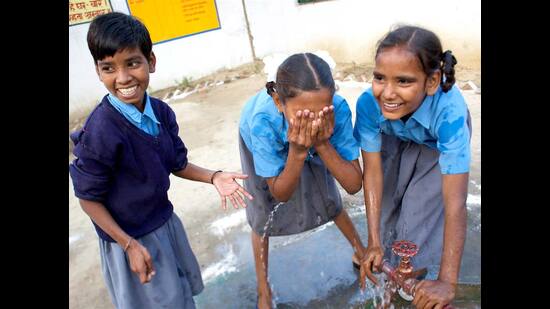The climate crisis threatens universal health care achievements
CCRI has placed India as one of the 33 extremely high-risk countries with flooding and air pollution being the repeated environmental shocks, leading to socio-economic adverse consequences for women and children
The climate crisis-induced disasters are among the most relevant dangers to human survival. Children, in particular, are at the receiving end. Today, an estimated 2.2 billion children worldwide are growing up facing the impacts of the climate crisis, even though they have the right to healthy and nutritious food, good physical, mental and social health, and access to knowledge. The climate crisis directly threatens these basic rights of children.

India is the third most disaster-prone country globally, next only to United States (US) and China, with children comprising 40% of its population. Any disasters impact the most vulnerable people and their children disproportionately.
The Children’s Climate Risk Index (CCRI), which ranks countries based on children’s exposure to climate and environmental shocks such as cyclones and heat waves, and their vulnerability to those shocks based on their access to essential services. Pakistan, Bangladesh, Afghanistan and India are among four South Asian countries where children are at extremely high risk of the impacts of the climate crisis, with a ranking of 14th, 15th, 25th and 26th, respectively. In addition, CCRI has placed India as one of the 33 extremely high-risk countries, with flooding and air pollution being the repeated environmental shocks, leading to adverse socio-economic consequences for women and children.
A human rights crisis
The climate crisis is a human rights crisis because the children of this and future generations will not have the basic requirement of life i.e. clean air, safe drinking water, and sufficient food and secure shelter.
On a larger degree, the climate crisis is also looming over the achievement of universal health care (UHC) through adverse health outcomes and disruption of the health care system. Although it is already creating a substantial global burden of disease, the current Disability-adjusted life years (DALYs) due to unsafe water, lack of sanitation and hygiene, urban air pollution, indoor smoke from solid fuels, and lead exposure dwarf the present-day effects of climate change on health. The incidence of many infectious diseases shows seasonality, and additional outbreaks frequently accompany extreme weather events. Since meteorological parameters influence vector reproduction, it is obvious to link disease outbreaks with climate change and to assume a correlation between increasing disease incidence and global warming.
However, the factors responsible for the emergence/re-emergence of vector-borne diseases are complex and mutually influence each other. Many countries with the highest susceptibility to the climate crisis have the lowest UHC coverage. These regions stand to have colossal gains through an integrated approach. Climate-sensitive illnesses are on the increase due to the extremes of weather impact.
Estimating the future burden of climate-related disease impacts on children is complex. The problem will affect the lifecycle of a child from the pre-conception period to his or her adolescence. Furthermore, people experience different inherent sensitivities to the impacts of the climate crisis at different ages and life stages. Hence, climate health strategies for children should be tailored as per their stage of life.
Keeping this in mind, India’s first National Action Plan on Climate Change (NAPCC) was released on June 30, 2008. In addition, a National Expert Group on Climate Change & Health was constituted in July 2015 to prepare an action plan, recommend strategies for adaptation, and capacity building.
UHC strategies must work to improve the thoughtfulness of climate crisis, use novel climate-sensitive financial frameworks, and incorporate the mitigation of greenhouse gases. They should strive for evidence-based climate adaptation that protects the health and prioritises health system climate resiliency. Integration of the climate crisis adaptation within global health strategy could mean both better sustainability of the existing programmes as the climate becomes increasingly unpredictable and better inclusion of these climate crisis efforts in the near-term international health programmes by coupling with programmes that already have funding,
Children’s environmental health indicators
Frameworks for prevention include the incorporation of climate crisis actions into the 10 essential functions of public health and the WHO’s efforts to develop internationally comparable Children’s Environmental Health Indicators (CEHIs). CEHIs—subdivided into categories of context, exposures, health outcomes, and actions—have emerged from several international agreements as a proposed tool for tracking the state of children’s environmental health. Prevention through adaptation, resilience, and mitigation.
Prevention strategies about climate crisis have primarily focused on reducing or mitigating greenhouse gas (GHG) levels in the global system. However, the concept of prevention in public health is multi-tiered.
To wrap up, there is a specified need to enhance monitoring of current children’s environmental health status, better incorporation of climate change adaptation into existing programs, and new climate-sensitive disease prevention programs that have short- and long-term health co-benefits.
Vikas Kaushal is head – health, Save the Children (Bal Raksha Bharat)
The views expressed are personal



